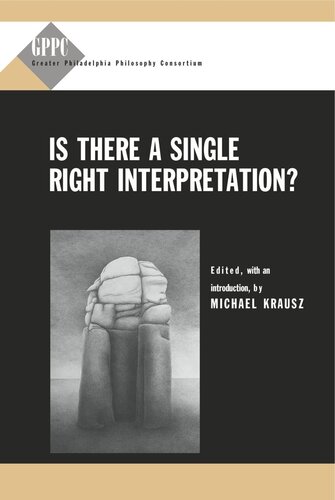

Most ebook files are in PDF format, so you can easily read them using various software such as Foxit Reader or directly on the Google Chrome browser.
Some ebook files are released by publishers in other formats such as .awz, .mobi, .epub, .fb2, etc. You may need to install specific software to read these formats on mobile/PC, such as Calibre.
Please read the tutorial at this link: https://ebookbell.com/faq
We offer FREE conversion to the popular formats you request; however, this may take some time. Therefore, right after payment, please email us, and we will try to provide the service as quickly as possible.
For some exceptional file formats or broken links (if any), please refrain from opening any disputes. Instead, email us first, and we will try to assist within a maximum of 6 hours.
EbookBell Team

5.0
98 reviewsIs there a single right interpretation for such cultural phenomena as works of literature, visual artworks, works of music, the self, and legal and sacred texts? In these essays, almost all written especially for this volume, twenty leading philosophers pursue different answers to this question by examining the nature of interpretation and its objects and ideals.
The fundamental conflict between positions that universally require the ideal of a single admissible interpretation (singularism) and those that allow a multiplicity of some admissible interpretations (multiplism) leads to a host of engrossing questions explored in these essays: Does multiplism invite interpretive anarchy? Can opposing interpretations be jointly defended? Should competition between contending interpretations be understood in terms of (bivalent) truth or (multivalent) reasonableness, appropriateness, aptness, or the like? Is interpretation itself an essentially contested concept? Does interpretive activity seek truth or aim at something else as well? Should one focus on interpretive acts rather than interpretations? Should admissible interpretations be fixed by locating intentions of a historical or hypothetical creator, or neither? What bearing does the fact of the historical situatedness of cultural entities have on their identities?
The contributors are Annette Barnes, Noël Carroll, Stephen Davies, Susan Feagin, Alan Goldman, Charles Guignon, Chhanda Gupta, Garry Hagberg, Michael Krausz, Peter Lamarque, Jerrold Levinson, Joseph Margolis, Rex Martin, Jitendra Mohanty, David Novitz, Philip Percival, Torsten Pettersson, Robert Stecker, Laurent Stern, and Paul Thom.